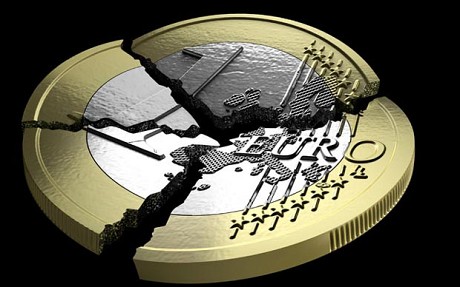
From Harald Malmgren and Robbin Laird, AOL Defense: Europe is essentially on its own in a fundamental sense as the key nations of Europe seek to sort through the disaggregation of the Euro zone, and the shaping of a new political and economic map of Europe.
We see at least three key actors that will by their actions re-shape the European map.
The first will be Germany. They will be key players in re-shaping the Euro and downsizing the Euro zone to what might be called the Ger-Euro. The economic and political weight of Germany will go up as the Euro crisis goes on; and the weight of German influence will be to re-shape the Euro zone into a more cohesive, "responsible" and integrated "core."
But this is a united Germany, which is shaping a Euro-cohesive process, not a divided Germany, which had to accept the dictate of smaller European powers to gain an end of national division. It is a Germany which already recognizes its increasingly intertwined future with Russia and the Far East. It is a Germany already pivoting East.
The second will be the Nordic states. These states are NOT part of the Euro zone, but are key players within Europe write large. And in many ways, the Nordics might be the architects of the new phase of Europe. The Arctic future is central to both Denmark and Norway, and Sweden has chosen a path towards free markets beyond the ken of the French in current circumstances.
All of the Nordics except Finland have independent currencies and have clear concerns about the dominance of Russia in energy markets within Europe; and have no confusion about the Russian challenge or the need for an American connection in exploitation of the Arctic.
In many ways, if the U.S. can shape a core Arctic policy – with presence, resources and commitment – this will matter most in re-forging an alliance with Nordic powers.
The third will be the Greeks and their fate. Greece is a metaphor for a weak economy, little prospect of economic growth and significant lack of political will to confront realistically the cost of social expenditures. The emergence of NATO was rooted in a Greek crisis; and perhaps the new European bargain will be as well.
In any case, the weakening of Greece, and the high probability that Greece will go its own way on currency and other economic issues will occur in the midst of the Chinese economic global reach and Russian (energy and other) activism in the Middle East. China and Russia will both be eager to become deeply involved in the destiny of Greece and its geographic position on the Mediterranean Sea.
In our report, we focus in some detail on each of these key actors and how their activities will re-shape Europe and the European map in the global dynamic.
But a key point is rather simple: unlike when the integration of Europe swept forward after the unification of Germany and the dissolution of the Soviet Union, American hegemony has been replaced by Russian and Chinese power and global activism. The re-shaping of the European map will have Chinese and Russian influences.
For example, with Russia expanding its activity in the Eastern Mediterranean, an expanded role in Greece would enable Putin to shape a more comprehensive presence in the Mediterranean and the Middle East. . . .
The New European Map
An important period of European history is at an end. The path towards European federalism is the logical outcome of the past twenty years of developments, but the challenges are difficult to continue down this path.
A more likely outcome is disaggregation and the restructuring of Europe. We have suggested that a new European map, in effect, could emerge and have discussed this map in terms of three dynamics: the formation of the Ger-Euro, the enhanced role of the Nordic states forged around their Arctic destiny, and the implosion of Greece. In future reports, there will be a continuing focus on other dynamics of disaggregation and the re-shaping of Europe.
We believe that the impact of outside powers will be significant in the period ahead in shaping the European map as we have known it in recent decades.
Harald Malmgren served as chief U.S trade negotiator under both Presidents Nixon and Ford. Since 1977 he has been adviser and strategist to international corporations, banks and sovereign wealth funds. He has also advised finance ministers and prime ministers of a number of governments. Robbin Laird, a member of AOL Defense’s Board of Contributors, is an international defense consultant, the owner of Second Line of Defense website, and a former National Security Council staffer. (graphic: Cowan Global)
Image: cowan%20global%207%2030%2012%20Cracked%20Euro.jpg
